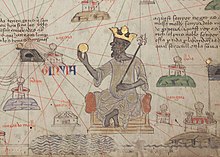Malinke

Sultan Mansa Musa's visit to Mecca in 1324 CE with gold attracted Middle Eastern and North African Muslims to Mandinka.
|
|
| Total population | |
|---|---|
| 13 million (1996) | |
| Regions with significant populations | |
|
|
714,000 (42%) |
|
|
3,063,431 (28%) |
|
|
2,638 988 (22%) |
|
|
5,123,420 (21%) |
|
|
1,984,200 (15%) |
|
|
208,180 (13%) |
|
|
306 900 (10%) |
|
|
465,813 (8%) |
|
|
245,300 (7.4%) |
|
|
687,822 (7%) |
| Languages | |
|
Mandingo language Eastern Maninka Western Maninka Kita Maninka |
|
| Religion | |
| Islam (99%), Animism | |
| Related ethnic groups | |
| Mandé peoples, especially the Dyula, Khassonké and Bambara | |
The Mandinka (also known as Mandenka, Mandinko, Mandingo, Manding or Malinke) is a West African ethnic group with an estimated global population of eleven million (the other three major ethnic groups in the region being the non-related Fula, Hausa and Songhai peoples). The Mandinka are the descendants of the Mali Empire, which rose to power under the rule of the Malinké/Maninka king Sundiata Keita.
The Mandinka belong to West Africa's largest ethnolinguistic group, the Mandé peoples, who account for more than twenty million people (including the Dyula, Bozo, Bissa and Bambara). Originally from Mali, the Mandinka gained their independence from previous empires in the 13th century, and founded an empire which stretched across West Africa. They migrated west from the Niger River in search of better agricultural lands and more opportunities for conquest. Through a series of conflicts, the Fula jihads, particularly the Fula-led Imamate of Futa Jallon, many Mandinka people converted from indigenous beliefs to Islam. Over 99% of Mandinka in contemporary Africa are Muslim.
The Mandinka people live primarily in West Africa, particularly in The Gambia and Guinea in both of which they constitute the largest ethnic group. Major populations of the Mandinka people also live in Mali, Sierra Leone, Ivory Coast, Senegal, Burkina Faso, Liberia, Guinea-Bissau, Niger and Mauritania. Although widespread, in most countries, the Mandingo are not the largest ethnic group. Most Mandingos live in family-related compounds in traditional rural villages, their traditional society has featured socially stratified castes. Mandinka communities have been fairly autonomous and self-ruled, being led by a chief and group of elders. Mandingo has been an oral society where mythologies, history and knowledge is verbally transmitted from one generation to next.
...
Wikipedia
